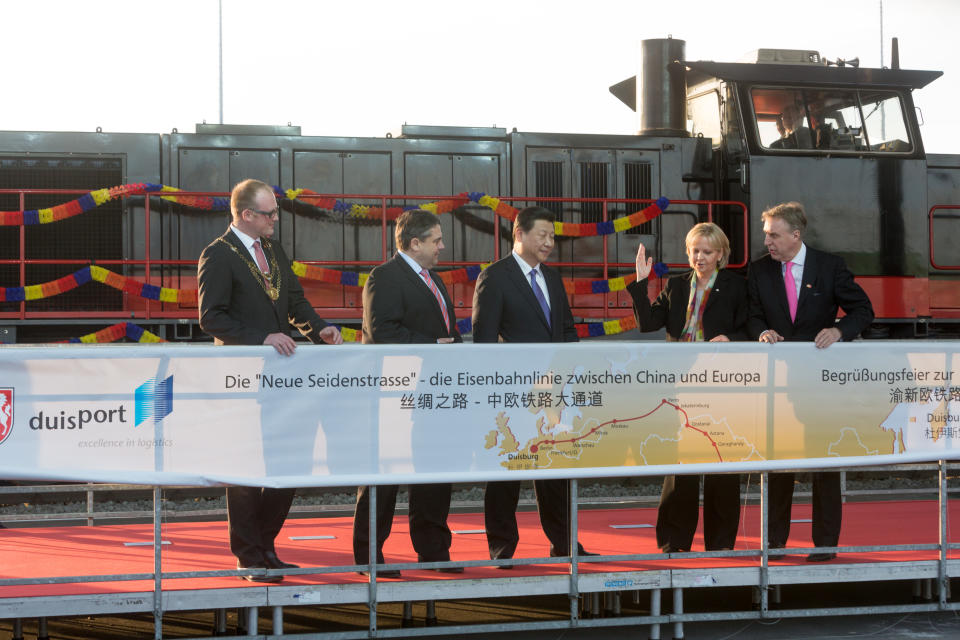Why a German rustbelt town is as well-known in China as Berlin

Some Europeans may not be able to point to the city of Duisburg in Germany on a map, but its name is as familiar in China as the German capital Berlin.
The rustbelt city of about half a million people on the banks of the Rhine in western Germany is Europe’s largest inland port. Its fame in China, however, is because of its location as the end point of Beijing’s “new Silk Road,” an 11,000km trainline stretching from China across Central Asia and Russia to Germany.
Duisburg mayor Sören Link has dubbed it “Germany’s Chinatown” and likes to say that Berlin and Duisburg are often the only two cities marked on German maps in China.
Johannes Pflug, the city’s China liaison told Yahoo Finance UK that Duisburg and Wuhan in China have been partner cities for 37 years. While freight trains have been running between the megacities of Chongqing, Chengdu, and Ürümqi and Duisburg since 2011, the harbour city was only put in the global spotlight in 2014, when Chinese president Xi Jinping visited.
“Since then the number of trains have reached about 25 a week and the number of Chinese companies in Duisburg has doubled to over 100,” Pflug said.
Duisburg has “very high name recognition” in China, he said. Last year at a conference in Shenzhen, attendees told him: “We know Berlin and we know Duisburg.”
Duisburg’s fortunes waned with the deterioration of Germany’s coal and steel industries. The home of steel giant Thyssenkrupp now has one of the highest unemployment rates in Germany, with 11% out of work, more than twice the national average. Becoming Xi Jinping’s gateway to Europe — it is just hours from France, Belgium, and the Netherlands — is a much-needed shot in the arm.

Erich Staake, chief executive of Duisburg Port, said at the company’s annual meeting in April that about 30% of the total train-freight trade between China and Europe was handled by Duisburg. This trade with China is "the most important growth segment for Duisburg," Staake said. "Of course, we want to expand that."
Construction of the €260m (£234m) China Trade Center Europe is to begin this year. Yaomin Wang, managing director of the Starhai Group real estate company behind the centre, said she expects about 200 Chinese companies, entrepreneurs, and agencies representing research centres and universities to eventually move in.
Xi Jinping’s ambitious Belt and Road Initiative, the sea-and-land infrastructure investment project, has been viewed with a degree of suspicion in Europe. Critics say it puts participating countries deeply in China’s debt and extends Beijing’s geo-political power. Italy caused a furore in March when it became the first G7 country to sign up to the project to get Chinese investment for its ports.
Pflug says he is not concerned that Duisburg could become too dependent on Beijing for its regeneration. “Duisburg’s relationship with China is that of an eye-level partner, we are not taking direct investment, that is our policy,” he said. He added that the message to Chinese businesses is “we have our own workforce in Duisburg, you don’t need to bring your own workforce.”
He claims that there are no German borrowers in Duisburg getting money from China but rather Chinese companies investing in their own Duisburg offices. “We pay attention to this,” he added.

Not everyone sees it so positively. Sebastian Heilmann, a China specialist at the University of Trier told Handelsblatt last year that “Chinese industrial policy aims to create value in China. Basically, foreign providers of technology are to be replaced by Chinese firms.”
There is also currently an imbalance as far as the trainline goes. According to Duisburg port boss, two trains full of Chinese goods arrive in Duisburg for every one that returns to China — and the port only earns one-fifth of the fee on empty containers that need to be sent back.
Staake said if it was possible to guarantee greater reliability of train traffic and if travel time could be cut down to 10 days, then European exporters would be more interested in using trains instead of expensive cargo planes.

 Yahoo Finance
Yahoo Finance 